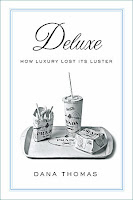 I wrote recently about how luxury has been downtrodden over the years, and how our own quest to live the good life has fueled the demand for cheap opulence.
I wrote recently about how luxury has been downtrodden over the years, and how our own quest to live the good life has fueled the demand for cheap opulence.
To me, this is a fascinating issue because it ties together the multiple effects of social stratification, class change, privilege and the common leveler of the retail market.
“Deluxe: How Luxury Lost Its Luster” is a captivating analysis of this very subject. Not since Thorstein Veblen and his “Theory of the Leisure Class: An Economic Study of Institutions” has this topic be analyzed so thoroughly and frankly. In many ways, Deluxe leaves Veblen’s effort in the dust.
Tracing the path of what we now know as the luxury retail industry, author Dana Thomas takes her reader on a trip through history and around the world. She revisits groundbreaking craftsman like Louis Vuitton and Christian Dior as they give birth to the luxury business – fleshing them out as the early visionaries they were. Thomas, a fashion and style writer for publications like the Newsweek, the New York Times Magazine, Harper’s Bazaar, and the Washington Post, has an incredible grasp of the subject matter.
Along with her exhaustive research, Thomas interviewed numerous fashion industry figures who give an insider’s perspective to the luxury industry, both before and after its mass market makeover. Notable are her discussions with and about Bernard Arnault, the ruthless CEO of Louis Vuitton Moet Hennessey (LVMH).
His transformation of several small companies once dedicated to an elite clientèle into a corporate behemoth focused on market saturation is both enlightening and saddening. Witty and authoritative, she brings the hazy and complex global network of manufacturers, designers, corporations and buyers into crisp focus.
Touching on manufactured trends like the seasonal “It Bag” and delving into global economies of scale and the impact of textile trade agreements, Thomas deftly explains how luxury became just another commodity product.
It is fascinating reading on an equally fascinating subject. You will never look at a “Made in Italy” label the same way again.